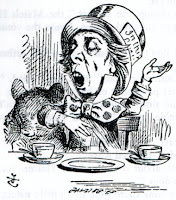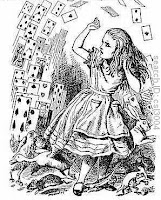Within the story Alice in Wonderland Alice completes the Warrior Hero's journey:
- Hero’s Journey Archetypes – the call and refusal of the call
 The initial Refusal of the Call can be seen when Alice
The initial Refusal of the Call can be seen when Alice sees the rabbit running along complaining, "Oh dear, oh dear
I shall be late!" (1) and does not take the initiative to follow it to wherever it is going. She finally answers the call after she sees
the rabbit takes his watch out of his pocket, she becomes "burning
with curiosity" (1) so much so that she follows it down into the
rabbit hole in order to see where it is going.
The threshold and the threshold guardian can be seen when she finally reaches the bottom of the rabbits pit and finds all of the doors that are locked, luckily she eventually finds the "tiny golden key" (3) upon which she is able to cross the threshold and enter into Wonderland. The locked doors represent the threshold guardians but the actual passage through the door is the threshold.
- Hero’s Journey Archetypes – the challenges
Alice faces many challenges when she is going
throughout her adventure, and the first of which is seen
in Alice's confrontation with the blue caterpillar who is
"in a VERY unpleasant state of mind" (13). The caterpillar
challenges her own knowledge of herself and is a
threatening presence to her own safety. Alice's next
major challenge can be seen in Alice's confrontation
with the Mad Hatter and the March Hare where she visits
them in their perpetual tea party. The Hatter and the Hare
challenge her saying with riddles and word-play that force
her to rethink why she is in Wonderland and make her want
to leave even more (22).
throughout her adventure, and the first of which is seen
in Alice's confrontation with the blue caterpillar who is
"in a VERY unpleasant state of mind" (13). The caterpillar
challenges her own knowledge of herself and is a
threatening presence to her own safety. Alice's next
major challenge can be seen in Alice's confrontation
with the Mad Hatter and the March Hare where she visits
them in their perpetual tea party. The Hatter and the Hare
challenge her saying with riddles and word-play that force
her to rethink why she is in Wonderland and make her want
to leave even more (22).
- Hero’s Journey Archetypes – the brother battle or the dragon battle
 The Hero's journey inevitable comes to many battles that
The Hero's journey inevitable comes to many battles that the Hero must face, Alice's first major battle is understanding
that the confines of her normal life do not fit with the confines
of Wonderland as when in Wonderland logic is not sensical
and Time can be stopped. In fact, Time is actually a man who
has forced the Mad Hatter life to be, "always six o'clock" (24),
which is really hard for Alice to wrap her head around, but
once when she understands this she is able to manipulate
and even overcome the forces at work in Wonderland.
Alice's first rapid journey in the story can be seen
when she immediately ravels from the Mad Hatter's to the
Queen's Croquet-Ground. At first she goes picking "her way
through the woods" and then in the course of two paragraphs
she is in the "long hall with the key" and then she is in the
"garden"(32)
when she immediately ravels from the Mad Hatter's to the
Queen's Croquet-Ground. At first she goes picking "her way
through the woods" and then in the course of two paragraphs
she is in the "long hall with the key" and then she is in the
"garden"(32)
The King and Queen of Hearts are the couple
that symbolizes the sacred marriage in the story as the
story lack no fanfare when introducing them. The book
describes their entrance, unifying them as one unit, as
the King and Queen, reading "last of all this grand
procession, came THE KING AND QUEEN OF HEARTS"(34).
that symbolizes the sacred marriage in the story as the
story lack no fanfare when introducing them. The book
describes their entrance, unifying them as one unit, as
the King and Queen, reading "last of all this grand
procession, came THE KING AND QUEEN OF HEARTS"(34).
The abyss can be seen when Alice commits
herself to leaving wonderland with the knowledge that she
can manipulate it after her talk with the rabbit when the
Queen was infuriated at the duchess, she rebels against
what is expected to herself when she "gave out a scream
of laughter" (37) at the Queens rage. Alice no longer fears
what "could" happen to her because she has committed to
her belief that she is dreaming and that she can manipulate
the dream in any way that she likes without negative
repercussions.
herself to leaving wonderland with the knowledge that she
can manipulate it after her talk with the rabbit when the
Queen was infuriated at the duchess, she rebels against
what is expected to herself when she "gave out a scream
of laughter" (37) at the Queens rage. Alice no longer fears
what "could" happen to her because she has committed to
her belief that she is dreaming and that she can manipulate
the dream in any way that she likes without negative
repercussions.
The resurrection can be seen in Alice's desperation
after she realizes that the Gryphon and the Mock Turtle are
just as delusional as all of the other characters in Wonderland.
She is at the lowest point in her journey when she realizes
that she is truly alone in her independent thought in
Wonderland. At one point in time she even "sat down with
her face in her hands" (42) because she was so in despair.
after she realizes that the Gryphon and the Mock Turtle are
just as delusional as all of the other characters in Wonderland.
She is at the lowest point in her journey when she realizes
that she is truly alone in her independent thought in
Wonderland. At one point in time she even "sat down with
her face in her hands" (42) because she was so in despair.
Eventually though, Alice embraces the fact that her
dream has no power over her and she accepts the fact that
she can do whatever she wants when she is in the queens
court and she initially begins to rebel by placing the jury in
their positions with ,"the Lizard in head downwards, with its
tail waving everywhere" (53) as she knew her actions held
no consequence.
dream has no power over her and she accepts the fact that
she can do whatever she wants when she is in the queens
court and she initially begins to rebel by placing the jury in
their positions with ,"the Lizard in head downwards, with its
tail waving everywhere" (53) as she knew her actions held
no consequence.
Alice embraces the knowledge of her power in
Wonderland for the final time when she thinks to herself,
"but it doesn't matter a bit" (55) while sharing what she
knew about the crimes. She has finally embraced that
her role in the dream has no matter so she is unworried
about the potential execution of the supposedly guilty knave.

Wonderland for the final time when she thinks to herself,
"but it doesn't matter a bit" (55) while sharing what she
knew about the crimes. She has finally embraced that
her role in the dream has no matter so she is unworried
about the potential execution of the supposedly guilty knave.

- Hero’s Journey Archetypes – the rescue
Alice's rescue takes place when she receives help
when she is magically turned back into her natural size
in order to fight off the pack of cards that comes to attack
her (60). Whatever outside force is turning her back to her
regular size is aiding her in her attempts to overcome the
cards.
when she is magically turned back into her natural size
in order to fight off the pack of cards that comes to attack
her (60). Whatever outside force is turning her back to her
regular size is aiding her in her attempts to overcome the
cards.
This happens finally when Alice's sister says to her,
"Wake up, Alice dear!" (64) and Alice wakes up from her
dream finally being able to escape the dread of such an
odd dream.
"Wake up, Alice dear!" (64) and Alice wakes up from her
dream finally being able to escape the dread of such an
odd dream.
Within the story Alice in Wonderland the Cheshire Cat fills the trickster archetype:
- The Trickster
The Cheshire Cat uses his clear-headed logic to
both manipulate and help Alice in her journey throughout
 Wonderland. He works to try to give Alice some
Wonderland. He works to try to give Alice some
perspective when he says, "we're all mad here. I'm mad.
You're mad." (37) She doesn't understand truly what it
means at first, but when you look into it, he is working to
give her a view of Wonderland as a whole, a land ruled
by irrationality where being in it makes you mad. The
Cheshire Cat is a definite trickster in Alice and Wonderland
as he does what he wants in order to please himself and
occasionally serve Alice.
both manipulate and help Alice in her journey throughout
 Wonderland. He works to try to give Alice some
Wonderland. He works to try to give Alice some perspective when he says, "we're all mad here. I'm mad.
You're mad." (37) She doesn't understand truly what it
means at first, but when you look into it, he is working to
give her a view of Wonderland as a whole, a land ruled
by irrationality where being in it makes you mad. The
Cheshire Cat is a definite trickster in Alice and Wonderland
as he does what he wants in order to please himself and
occasionally serve Alice.








